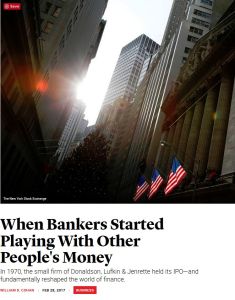Join getAbstract to access the summary!

Join getAbstract to access the summary!
William D. Cohan
When Bankers Started Playing With Other People’s Money
In 1970, the small firm of Donaldson, Lufkin & Jenrette held its IPO – and fundamentally reshaped the world of finance.
The Atlantic, 2017
What's inside?
Wall Street was once a bastion of fiscal prudence and accountability. What happened?
Recommendation
Wall Street was once a bastion of fiscal prudence, collaborative decision making and personal accountability. That centuries-old culture changed in the space of two decades. By the late 1980s, Wall Street had earned a reputation as a “casino” in which brash traders could win outsize rewards for gambling with other people’s money. Author William D. Cohan, a former investment banker and author of Why Wall Street Matters and House of Cards, outlines how one New York Stock Exchange member’s 1969 filing for an initial public offering drove rule changes that revolutionized the way Wall Street conducts business. getAbstract recommends this article to anyone interested in how Wall Street became what it is today.
Summary
About the Author
Former investment banker William D. Cohan is the author of Money and Power, House of Cards, The Last Tycoons and Why Wall Street Matters.


















Comment on this summary